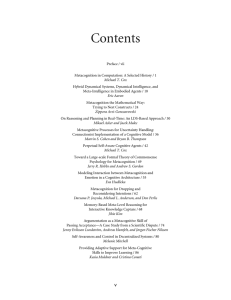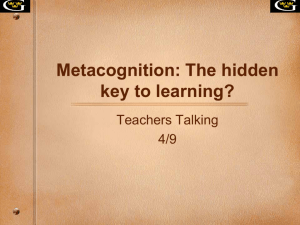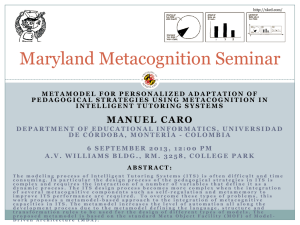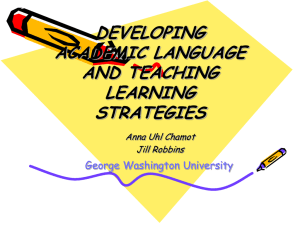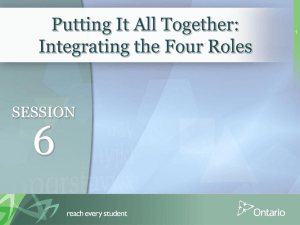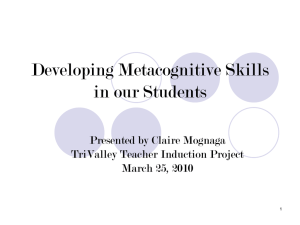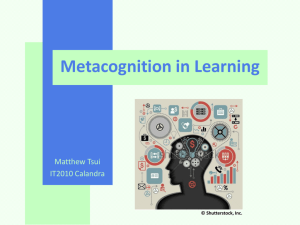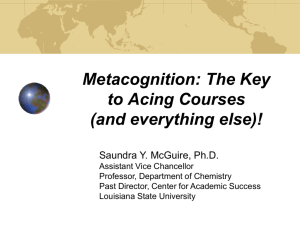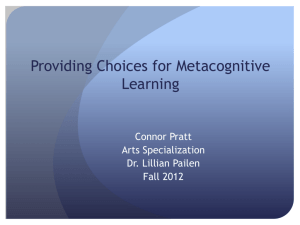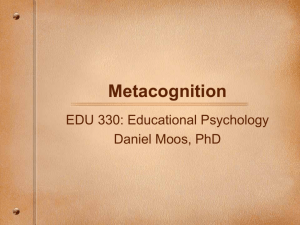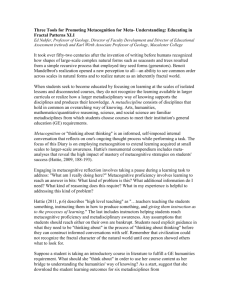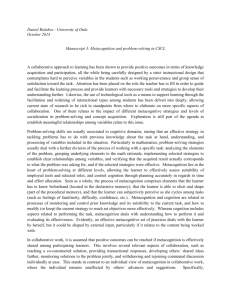Presentation - Virginia Western Community College
advertisement
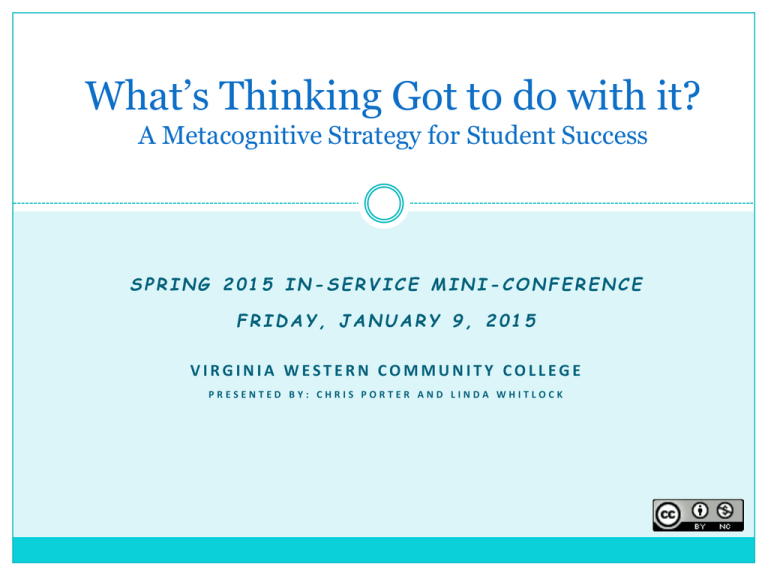
What’s Thinking Got to do with it? A Metacognitive Strategy for Student Success SPRING 2015 IN-SERVICE MINI-CONFERENCE FRIDAY, JANUARY 9, 2015 VIRGINIA WESTERN COMMUNITY COLLEGE PRESENTED BY: CHRIS PORTER AND LINDA WHITLOCK Michelle First semester student– trouble with Psych “Studied hard” but failed first exam miserably Had done well in High School Was frustrated and wanted to do better Met with SDV instructor and referred to Link Academic Success Coach Initial meeting – looked at exam results Spent bulk of study time on lecture notes Worked on reading comprehension skills and learning from the text Result: Student earned an A in Psychology Metacognition: What is it? Metacognition refers to awareness and monitoring of one’s thoughts and task performance, or more simply, thinking about your thinking (Flavell, 1979). It refers to higher-order mental processes involved in learning such as making plans for learning, using appropriate skills and strategies to solve a problem, making estimates of performance, and calibrating the extent of learning (Dunslosky and Thiede, 1998). Breaking Down Metacognition Metacognitive Knowledge What we know about how we learn The ways that we know to go about learning - cognitive activities, procedures, strategies Being able to decide when the conditions are right to use each cognitive activity Metacognitive Regulation Planning Monitoring Evaluating / Adapting Adapted from Schraw & Moshman article Metacognitive Theories (1995) Changes in Thinking Ability to learn is not fixed. Metacognitive skills can be learned There are no easy outs! Learning requires effort, and effort will produces results. (Schraw & Moshman, 1995) What We Have Learned From Research Metacognitive skills and beliefs about learning have consequences for students' learning and performance. Teaching metacognition - introducing these new skills and beliefs, and giving students practice at applying them - improves students' learning. Low-cost interventions can have big payoffs. (Lovett, 2008) ACADEMIC SUCCESS Metacognition Self Regulation • • • • Goal Setting Decision making Time Management Concentration/Focus Academic and Career Planning • Program of study • Course Selection • Career Plans • Navigating the bureaucracy Active Learning Strategies Every Day Assignments Exam Prep • Lecture • Text • Editing Notes • Organization • Decoding • Expectations • Segmentation • Completion • Scope/Style • New ALSs • Mastery • Practice Recall Learning STYLES Multiple Intelligences Motivation Created by: Chris Porter Virginia Western Community College Link Mission The Academic Link connects students to academic success by supporting the development of critical learning skills through services and supports that assist students in becoming better learners. Metacognitive Tutoring Traditional Tutoring – Content Focused Occurs when student perceives a need Tutor works with student on specific concept, problem, or test prep Metacognitive Tutoring – Learning Focused – Occurs on regular basis – Tutor helps student analyze and understand his or her learning process – Tutor assists student in developing learning goals and identifying the strategies and skills necessary to achieve those goals Academic Success Coaching ● Component of overall tutoring strategy ● Available to all students (Michelle) ● Tailored to specific student circumstances ● In-depth assistance with developing learning skills and strategies. Bloom’s Taxonomy in Action Key to college level learning is to move progressively up Bloom’s Taxonomy of Learning Remembering Understanding How do we put this into our practice? How do you use metacognitive strategies in working with students? Application in the Classroom Wrappers A wrapper is an activity that surrounds a pre-existing learning or assessment task and fosters students’ metacognition One can build a self-monitoring wrapper around any pre-existing learning activity (lecture, assignment, test) Example Why Wrappers Work Time efficient - Students are doing the task anyway Metacognition practice is integrated with the task Students are self-monitoring in the context where it is needed Feedback on accuracy can be built in Wrapper support can be gradually faded Research shows even minor interventions that frame a task in a new way can significantly change behavior (Lovett, 2008) More Applications in the Classroom Self-Testing - exam prep planning Be explicit on the level of thinking expected on an assignment – many do this in the form of rubric Pull apart the definition of the term “studying” and what that looks like in your course. (Combining content knowledge with pedagogical knowledge) Even More Applications “Studying” is an ambiguous term at best Subject specific strategies Teaching a particular Active Learning Strategy (ALS) and incorporate it into an assignment Creating a Study Plan – instead of creating a study guide or review guide, provide a template for students to complete their own study plan. List of Active Learning Strategies Revising Notes e.g. concept maps Writing Summaries Writing Recall Questions Marking text Using review questions Creating Outlines Mnemonics/Acrostics memory aides Creating graphic organizers Making Note Cards Self-Testing Creating Summary Sheets or Study Guides Thematic Studying 5-Day Study Plan What’s Thinking Got to do with it? THANK YOU!! References Brown, A. (1987). Metacognition, executive control, self-regulation, and other more mysterious mechanisms. In F. Weinert and R. Kluwe (Eds.), Metacognition, motivation and understanding (pp. 65-116). Hillsdale, NJ: Erlbaum. Flavell, J. H. (1979). Metacognition and cognitive monitoring: A new area of cognitivedevelopmental inquiry. American Psychologist, 34, 906 – 911. Lovett, M. (2008). Teaching Metacognition: Presentation to the Educause Learning Initiative Annual Meeting, 29 January 2008. Schraw, G. and Moshman, D. (1995). Metacognitive Theories. Educational Psychology Review, 7(4), 351-371. Thiede, Keith W. and Dunlosky, John (1998). Toward a general model of self-regulated study: An analysis of selection of items for study and self-paced study time. Journal of Experimental Psychology: Learning, Memory, and Cognition, 25(4), Jul 1998, 1024-1037.
